Observations in India – trading
March 22, 2010
Topics: India
We still reside in Varkala town in Kerala, a Southern state of India. We will leave this place in the first days of May.
In this entry we will share a few observations about local traders and trading in India in general.
Packaging
Old newspapers, colorful rubber bands, and rope made from coconut husk fiber – all of these items are very important if you are an Indian seller. It does not matter what one is buying – traders tend to wrap everything inside newspaper. If the package appears to be a small one – they will place a rubber band on top of it. If the package is bigger – it will be carefully tied with a thin coconut fiber rope.
We bring newspaper packages almost everyday. Once we bought an electricity plug adapter which already had a small carton box. Additionally, the seller wrapped it into a newspaper and fixed it with rubber band. We also got a local made halva sweet wrapped directly into a newspaper. Bigger packages, like 1 kg of apples, grapes, bananas, or some houshold items, for example – a plate, are always “secured” with a rope.
Plastic bags are also widely spread and given for free. So, most of the times, the seller is about to place the newspaper wrapped item into a new plastic bag and hands it over to us. As we have no wish to increase our plastic collection at home (we wash and carry them with us wherever we go), we always refuse new bags and sometimes it takes some effort.
MRP – Maximum Retail Price
The fact that most of the items in the shops have printed MRP (maximum retail price) on the package, makes us (and probably other visitors of India) very happy, as we naturally avoid being overcharged. In kiosks and small shops we always pay MRP as it is stated on the packaging, while in supermarkets the prices are usually a little bit lower than MRP.
Business model I
Imagine, you have your favorite shop, where you are used to buy curd. Usually you take 2 packages of curd, but one day you have guests and decide to buy 2 extra packs. At this point, do not be disappointed if the seller will deny to sell you 4 packages. His argument might be that later on other customers will need this curd, and the shop wants to sell to them as well. This is what happened to one of our friends here in Varkala.
Indeed, principles and human values are most important for sellers!
Business model II
Every morning we drink at least half a liter of young coconut water. This drink is very nutritious and healthy. It also cools the body down in this heat. Therefore, every 3-4 days we go coconut shopping at the coconut lady’s place. She sells coconuts every single day next to the beach. We usually drink 2-3 coconuts at her place, and buy another 20, which we pack in the backpack and carry home (25 min by foot).
30 m away from our coconut lady is another coconut seller. Both of them are rather competitors than friends. When we started bulk purchases of coconuts, we tried both of the traders. In the end we sticked to the lady, and we never went back to the other seller, even though he was sometimes waving to us… obviously still having a little hope. No doubt, soon we were listed in his blacklist.
Once our coconut lady was absent for a couple of days in a row. She did not have any coconuts, because the guy, who climbs and gets them from the huge 20 meter long palms, was sick. We were thirsty for coconut water, so we decided to re-introduce ourselves to the other man, who had lots of coconuts on sale. However, at the moment we approached him, he gave us a short and clear message: “No no… I have no coconuts…” End of the story.



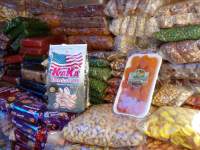
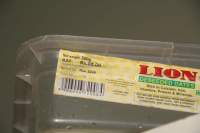
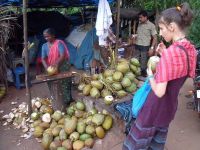
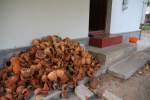
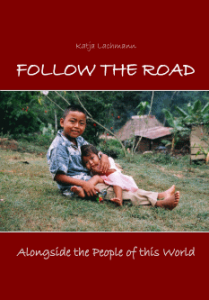
Comments
Leave a comment